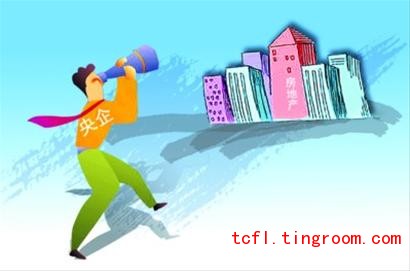
央企近日频频成为“地王” 引起普遍关注, 人们不禁要问央企拿地是否推动了房价的上涨?
出席周日中国发展高层论坛的国务院国有重点大型企业监事会主席熊志军表示,房价上涨不是由央企拿地造成的。
“地价是受房价决定的,而不是房价是由地价决定的,这属于经济基本常识。”熊志军表示,认为高地价是由于央企进入房地产行业所致的说法不对,“不管那地是不是央企拿了,都和普通老百姓的住房无关。地王都是黄金地段的,无论谁拿了价格都会很高。”
在回应“央企都退出房地产市场”时, 国务院国有资产管理委员会副主任邵宁认为,如果不解决供给和需求问题,房价不会有太大的变化。
邵宁表示,房价是由房市的供给和需求决定。如果房市供给不足,房价必然涨。反之不会大涨。
邵宁认为,调控房价须从供给和需求两个角度去采取措施,尤其是抑制投资性的需求。现在的招拍挂制度必然产生“地王”,“因为是竞争,不管是谁最后拿到,都会成为‘地王’”。
“不能因‘地王’而否认土地交易的招拍挂制度”,他表示,这是个好制度,因为它是透明的,是阳光的,是竞争性的,它可以防止暗箱操作,可以防止腐败。
他认为,“地王”现象的直接受益者是地方政府,因为“地王”增加了地方政府的土地收入,“这不是坏事情,关键是这笔收入用到哪儿去”,政府要把其中的大部分收入转移到为低收入者建房。
虽然国资委宣布78家不以房地产为主业的央企将退出房地产业务,但昨天邵宁避免谈到央企退出房地产业的具体时间表。
据国资委消息,共有16家央企以房地产为主业开展房地产业务。数据显示这16家央企房地产板块的资产总额为5600亿元,占全部央企房地产板块资产总额的85%。
Do state-owned enterprises push-up land prices?
Last week, centrally controlled state-owned enterprises (SOEs) won a series of land bids with record prices in Beijing. This has led people to wonder if these firms are pushing up the price of land.
At Sunday's China Development Forum 2010, Chairman of the Supervisory Board for Key Large State-Owned Enterprises Xiong Zhijun said SOE land bids didn't result in soaring housing prices, according to The Beijing News on Monday.
"It's not the land price that decides the housing price, but the housing price that decides the land price, which is general economic knowledge," Xiong said. He disagrees with the belief that SOEs entering the property industry push up high land prices. "No matter who wins the land bids, there is no relation to ordinary people's housing. The land, which the bidding kings won, is located in the most prosperous district. The price is high by itself."
When asked about "some central SOEs exiting the property market," Vice Chairman of the State-owned Assets Supervision and Administration Commission (SASAC) Shao Ning said if the supply and demand can't be sorted out, then housing prices won't see a big change.
Shao said housing prices are determined by the supply and demand of the property market. If the supply can't meet the demand, the price will no doubt increase.
He said measures should be taken from both aspects of supply and demand to adjust housing prices, especially to restrain investment demand. The bid invitation, auction and listing system of land remising will certainly produce "land kings," simply due to the competitive nature of the game. "No matter who wins the bids, the land itself will become a land king," he said.
"The bid system shouldn't be denied as 'land kings' appear," he said. "It's a good system because it's transparent and competitive. It can also avoid closed-box operations and corruption," he added.
In his opinion, the "land king" phenomenon directly benefits the local government since it increases the local land income. "It's not a bad thing, but the key point is how the local government spends it." He says most of the money should be used in building houses for low-income families.
The SASAC last Thursday said 78 centrally controlled SOEs whose core business is not property must gradually exit the real estate market, although Shao didn't release the detailed schedule at the forum.
According to the SASAC, there are 16 centrally controlled SOEs whose core business involves real estate development. Data show they have a total asset of about 560 billion yuan, which makes up 85 percent of all the centrally controlled SOE assets in the property sector.
(China.org.cn translated by Zhou Jing, March 26, 2010)
 English
English Japanese
Japanese Korean
Korean French
French German
German Spanish
Spanish Italian
Italian Arab
Arab Portuguese
Portuguese Vietnamese
Vietnamese Russian
Russian Finnish
Finnish Thai
Thai dk
dk